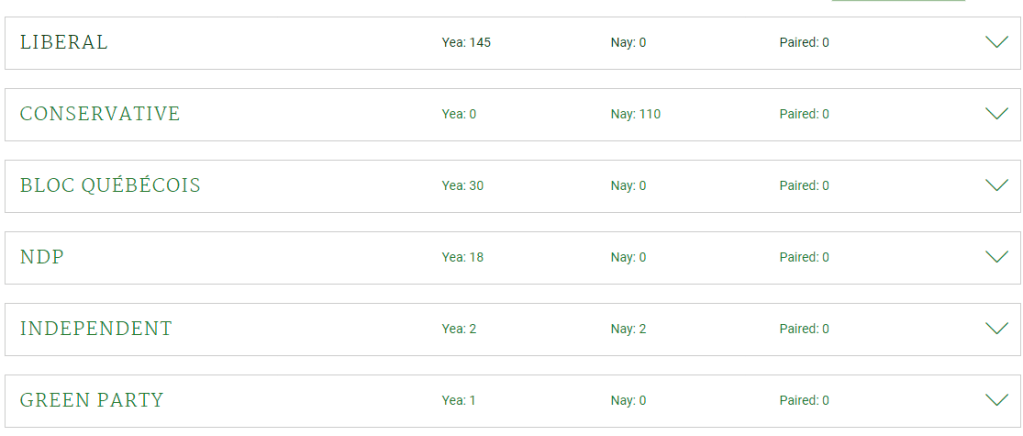By: Greg Staley
Written On: 2021-06-22
On June 22nd at 1:30 in the morning, the Liberal Government of Canada passed the controversial bill C-10 (196-112) with help from the Bloc and NDP and one vote from the Green Party. The bill is now on Its way to the Senate for approval.
What does the Bill Do?
One of the main changes that Bill C-10 creates is it adds “online undertakings” or “programs over the internet” as a distinct class of broadcasting undertakings that will be subject to the Canadian Radio-television and Telecommunications Commission (CRTC) enforcement. This allows for the second big change of bill C-10 to take effect – the commission (CRTC) will be provided with the power to “require that persons carrying on broadcasting undertakings make expenditures to support the Canadian broadcasting system.”
Who does this benefit?
Open Media’s Matt Hatfield has done a great job of breaking down how bill C-10 benefits traditional legacy media the most. Hatfield wrote that “companies like Bell Media and Corus Entertainment built their businesses around TV, not the Internet, and would much rather the Internet look like cable than adapt what they do to the modern web.” Mr. Hatfield continued, “There’s no crisis for funding for their broadcasts that qualify as traditional CanCon, which reached a several-year peak in 2018 and has remained stable over the last 10 years. But overall revenue from television broadcast has been declining for these companies since 2014.”
This is why that matters. Bill C-10 will force companies like Netflix and YouTube to pay into a fund. Although the bill doesn’t specify that the money has to go to the Canada Media Fund, if it’s designated to this fund, under current rules the funding it provides will not be accessible to companies like Netflix – regardless of all the Canadian content they produce. This was exactly Netflix’s point – how is it fair to pay into something they can’t access even if they produce “Canadian content?” The Short answer is it isn’t fair.
Companies like YouTube and Netflix may be forced to pay into a fund that traditional legacy media outlets like Bell Media and Corus Entertainment would have access to but these same funds would be inaccessible to companies like Netflix or YouTube. Ultimately, this would lead companies that provide streaming services like YouTube, Netflix or Crave to abide by CRTC broadcast rules or face fines. They would have to ensure their algorithms showed what the CRTC wants Canadians to see – not what Canadians want based on their search preferences.
Michael Geist Comments
Michael Geist is a Law Professor & Canada Research Chair in Internet and E-commerce Law for the University of Ottawa who has been an outspoken critic of Bill C-10. Mr. Geist wrote that the late-night debate included “obvious errors from Liberal MPs who were presumably chosen to defend the bill.” In providing an example Mr. Geist wrote “for example, Julie Dabrusin, the Parliamentary Secretary to the Minister of Canadian Heritage, said that Section 2.1 in Bill C-10 “specifically excludes content uploaded by users.” Only it doesn’t as Dabrusin should know given that 2.1 covers users not content.”
Essentially, the language in the bill is still ambiguous about whether or not those that upload content to platforms like YouTube would be subject to the CRTC regulations under the new amendments proposed in Bill C-10. Would organizations that produce news content like Diverge Media be subject to pay fees to the CRTC or will only be the platforms that provide the services? Either way, it could cause companies like Netflix or YouTube to not offer their services in Canada or to increase their costs to offset the costs imposed on them by bill C-10.
Good News – Senate Unlikely to pass bill C-10
Mr. Geist writes “The bill now heads to the Senate, where based on reports, it is unlikely to get very far. Senator Dennis Dawson, a former Liberal MP and currently a member of the Progressive Senator Group, says there is a “zero-per-cent chance” the Senate will approve it by the end of this week when it breaks for the summer.
So, the good news in short is that the bill is unlikely to be fast tracked through the Senate before the end of this week when it breaks for the summer. Start messaging Senators now and let them know what you think about this bill. It desperately needs a comprehensive review and needs to protect digital content creators from the purview of the CRTC. Here’s to hoping that an election kills the bill.
Diverge Media is an independent Canadian media company dedicated to bringing you the stories that matter. Unlike many of our mainstream media competitors, we don’t receive your taxpayer dollars to subsidize our work. Therefore we rely on merch sales and donations to fund our work. Check out or merch below and consider purchasing a hat or t-shirt or leaving a donation! All the best, the Diverge Media team.


